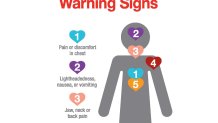Heart Health Month 1
Tuesday, Feb. 1, kicks off American Heart Month. The yearly effort by the American Heart Association signifies a time to raise awareness of cardiovascular health, especially for women and communities of color.
The facts about heart health in women are concerning, but important to know:
Watch NBC 5 free wherever you are
- Cardiovascular disease is the #1 killer of women.
- Women, especially Black and Hispanic women, are disproportionally impacted by heart disease and stroke.
- Research shows heart attacks are on the rise in younger women.
- At least 48% – nearly half -- of all adults in the United States have some form of cardiovascular disease.
- Cardiovascular disease is the no. 1 killer of new moms.
- Pregnancy-related deaths in the U.S. are rising at an alarming rate — and cardiovascular disease is the leading cause.
“When it comes to cardiovascular disease, our own behaviors and our choices have the biggest impact on what your future risk is," said Dr. Sreenivas Gudimetla, a cardiologist with Texas Health Fort Worth. “It’s good to establish good healthy habits early in life."
Get top local stories in DFW delivered to you every morning with NBC DFW's News Headlines newsletter.
He said that's important because another issue he's seeing in his patients is obesity, which is leading to higher rates of people getting Type 2 diabetes in their 20s and 30s.
"That was almost unheard of 40 or 50 years ago. That is increasing the risk of developing cardiovascular disease," Gudimetla said. "When we’re in our 20s, we have this attitude that we are invincible. But the problem is we don’t get the message out very clearly that that is the time to start taking care of yourself. Not waiting until you have a midlife crisis in your 40s and 50s."
Local
The latest news from around North Texas.
Data suggests younger generations of women, Gen Z and Millennials, are less likely to be aware of their greatest health threat, including knowing the warning signs of heart attacks and strokes.
Oftentimes, Gudimetla said patients who present to him with a cardiac event are already at a very advanced stage in their disease process.
“Once you develop cardiovascular disease, you can’t make it go away. We can manage it with wonderful procedures and medication and so forth but we can’t cure it and that’s important to know," said Gudimetla.
KNOWING YOUR HEART
Doctors hope knowing the symptoms of a heart attack can save a life. Symptoms can include the following:
- Feeling of pain, pressure, squeezing or fullness in the chest
- Pain in the jaw, neck or even back or stomach
- Lightheadedness
- Nausea
- Vomiting
- Shortness of breath
- Sweats

Symptoms can differ between women and men.
“This has been a historical challenge for many years because the mortality from cardiovascular disease in women is much higher than it has been in men," Gudimetla said. "That’s a challenging piece of diagnosing cardiovascular disease, the symptoms can range in that whole spectrum and therefore people can fall through the cracks as a result."
Women don't always see all these classic symptoms. It might just be one or two symptoms or none at all.
“The challenge in women is that they don’t have those classic symptoms a lot of times. They could have sort of unexplained shortness of breath. Another very frequently missed symptom in women is fatigue and feeling tired," he said. “Unfortunately that’s why a lot of heart attacks are missed because you can have a range of symptoms to even silent heart attacks, not having any symptoms at all. That’s more common in the diabetic population for instance it can range from that to having severe enough symptoms where you feel like you have to go check it out right away."
COVID-19 has also presented several different heart-related impacts for those who get infected.
Some are experiencing very low heart rates, prolonged shortness of breath that lasts for months after they've contracted COVID, and inflammation in the heart. All of which are things that are alarming to doctors and are still being studied and researched right now.
"We see anything from what we call COVID myocarditis, which is basically viral inflammation of the heart muscle -- which can cause weakening of the heart muscle and heart failure. We've also seen various arrhythmias in COVID patients," said Guidmetla.
PREVENTION
Gudimetla offers up some general practices people can begin right now on their journey to a healthier heart:
- Don’t smoke cigarettes
- Follow a Mediterranean diet, full of lots of fruits, vegetables, and white meats.
- Be physically active
- Maintain a healthy weight
The American College of Cardiology recommends 150 minutes a week of moderately intense physical activity, which is around 30 minutes a day five days a week.
“What is defined as moderate-intensity activity is -- during the activity you feel like you’re getting a workout but you’re able to complete a sentence during the activity without having to stop to breathe," said Gudimetla. "So we’re not talking about distance running or marathon training. We’re talking about aerobic exercises and a brisk walk for instance."
According to the American Heart Association, 80% of cardiac events can be prevented through education and lifestyle changes such as moving more, eating smart, and managing blood pressure.
That is why it’s important to know your numbers. Discuss the following personal health numbers with your doctor to help determine risk for heart disease:
- Total Cholesterol
- HDL (good) cholesterol
- Blood pressure
- Blood Sugar
- Body Mass Index (BMI)
"The target BMI is anywhere between 18 to 24.9. Between 25 to 30 is considered overweight and above 30 is considered obese," said Gudimetla.
Knowing your family history is also key. Talk to your doctor about heart disease and stroke if those conditions run in your family.
If you do have a family history, take charge of your health. If you can check the box on any of the following factors, you are at higher risk for cardiovascular issues:
- High blood pressure
- Smoking
- High blood cholesterol
- Lack of regular activity
- Obesity or overweight
- Diabetes
To show support for these issues and to encourage women to be aware of the risk factors for heart issues, people are encouraged to wear red this Friday for National Wear Red Day.



